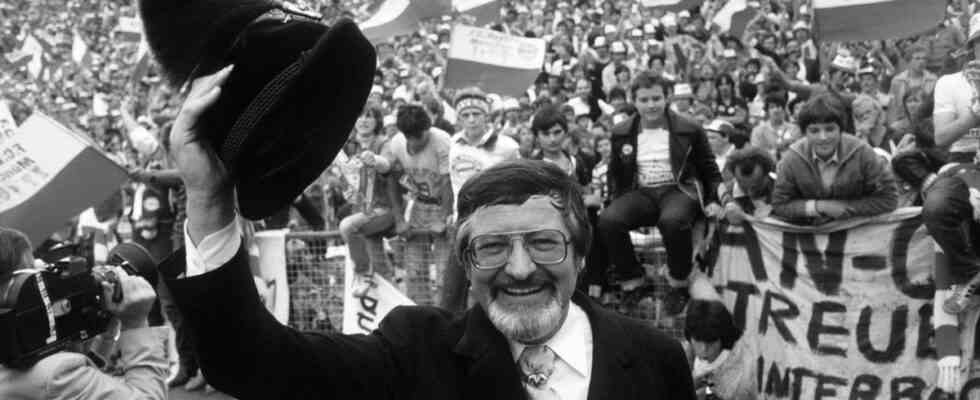One of the anecdotes that will now be told again about Willi O. Hofmann is that of a European Cup evening for FC Bayern in Belgrade. The team was stuck at the airport in snow and ice, but could not take off (which was to be repeated a few decades later in Berlin and led to moderate discord between the offended world club and allegedly disrespectful capital city bureaucrats). The reason: the machine did not have enough fuel in the tank. In order to get home after all, Hoffmann had the passengers gather and buy more fuel.
The other anecdote you need to know is how Hoffmann got his nickname: A reporter asked the FC Bayern president, known for his love of sparkling wine, if he would be angry if he, the reporter, called him, the President, would call “Champagne Willi” in his next article. This is how times are changing: today the reporter would no longer ask, and the President would no longer be placated. But Hoffmann was right about it.
“He became president during a turbulent phase, there was real chaos at FC Bayern,” said honorary president Uli Hoeneß two years ago on Hoffmann’s 90th birthday. “But he is an incredibly creative person who never showed anything, even when he was very worried. He played a key role in helping FC Bayern to become the club we all know today.”
Hoffmann was the symbiosis of classic, renaissance and baroque. This may be difficult to prove in terms of cultural history, but the club’s history leaves no doubt that Hoffmann, born in Sendling in 1930, as club president from 1979 to 1985, defined FC Bayern’s “Mia san mia” and “Hund sans scho” characteristics no second.
With Hoffmann, the club, which had been waiting for the next championship since 1974, had reason to celebrate again
The “O.” in his name, which gave the boyish “Willi” something almost poetic, stood for Otto – a homage by his parents to Prince Otto, who later became King of Greece. His father, the Bavarian King Ludwig I, admired Greece so much that he had Munich tailor his neoclassical dress, which is still influential today. The “O.” but also fits as an exclamation of astonishment at a career that was riddled with successes as well as scandals that forced Hoffmann to resign in 1985.
President and champion maker: After two joint championships, two DFB cup victories and a European national champion final, Willi O. Hoffmann said goodbye to Paul Breitner in 1983 when he retired. The captain was indirectly responsible for Hoffmann’s election as president.
(Photo: imago sport photo service)
At the age of 28, the son of a toolmaker joined the association. In 1962 he was promoted from secretary to treasurer and experienced promotion to the Bundesliga, cup victory, first championship and European Cup triumphs. Money was tight, but the holidays were plentiful, and Hoffmann was considered a party beast – even if Louis van Gaal was the first to establish this term. Surpassed perhaps only by the young, wild Paul Breitner.
When Bayern once again introduced a start-finish championship in 1973 and toasted it with champagne, slightly bored, Breitner complained that “you can’t even really celebrate in this shitty club”; a year later he moved to Madrid. Coincidence or not: After his return, Breitner helped Hoffmann become president. The opinionated playmaker instigated a palace revolution against coach Max Merkel, who had been chosen by then-President Wilhelm Neudecker. Neudecker resigned on March 24, 1979. His successor: Willi O. Hoffmann.
Zampano in the Bavarian circus: Hoffmann swings the whip in 1981 with the old and new German champions.
(Photo: Horstmüller/Imago)
With Hoffmann, the club, which had been waiting for the next championship since 1974, finally had a reason to celebrate again. Breitner and Karl-Heinz-Rummenigge took charge on the pitch, and a young manager named Uli Hoeneß led the club, which had debts of eight million Deutschmarks, into the black. After two championships, two DFB Cup victories and a European national championship final, Bayern Munich sold Rummenigge to Milan in 1984 for the then world record price of twelve million marks – and the club, which had just been teetering on the brink of bankruptcy, was suddenly solvent again.
When the fans sang “Take off the Bavarians’ lederhosen!” Hoffmann waved his gamsbart hat and grinned all the more
Hoffmann had them done and staged himself as a bearded, bulbous Bavarian Kini. He drank from goblets, champagne bottles and beer mugs. After victories, he invited the players and their wives to a posh restaurant in Munich. And when the fans in Bremen, Hamburg or Dortmund sang “Take off the Bavarians’ Lederhosen!” Hoffmann waved his Gamsbart hat with an even wider grin. Perhaps nothing describes the bon vivant Hoffmann better than the contrast to his successor Fritz (no middle name) Scherer. Hoffmann’s model of the Bavarian Kraftlackl – at that time FC Bayern traveled under the slogan “Die Bullen werden” – Scherer repainted discreetly but consistently into a smaller format, more naturalism than Jackson Pollock. Under Scherer, the Bavarians drove Opels. More basic German down-to-earthness is hardly possible.
During his tenure, Hoffmann improved the training conditions on Säbener Straße, had courts and a youth center built. Privately, the owner of a tax office became more and more hopelessly entangled in dubious financial transactions and company constructs. He invested in hotels and builder models, founded companies and companies, dealt with write-offs and even wanted to get into uranium mining (which came to nothing). In July 1985, the once resourceful fundraiser filed for bankruptcy, and on October 9 he resigned from his presidency. He was fined in the 1990s, followed by a one-year suspended sentence in 2003 for tax evasion.
Willi O. Hoffmann, father of five children, died in Munich on Tuesday at the age of 92. He was the club. The club is him.

